Here is an example:
There are four variables, the first two are self-explanatory, just enter the date in YYYYMMDD format, the 3rd one is to set the number of normal work days in a given week, so if a site works 6 days a week, set it to 6, five days a week enter 5, etc. Finally, the
DATE_SEQ_NORML_FACTOR should be 1 when running against Oracle. This is to line up the Julian date to equal to 1 on Monday, 2 on Tuesday, etc when applying the MOD 7. Other DB will probably have different values between 0 and 6, so test it out before you use against other DBs.
Here are the limitations:
1. This formula assumes the first day of the week is MONDAY.
2. This formula assumes all days within the same week are CONTINUOUS.
3. This formula will work ONLY when the two dates involved in the calculation falls on a week day or work day, eg. the "Start Date" on a SATURDAY when the location works only MON-FRI will not work.
SELECT
&&START_DATE_YYYYMMDD "Start Date", --in YYYYMMDD format
&&END_DATE_YYYYMMDD "End Date", --in YYYYMMDD format
&&WK_WORK_DAY_CNT "Week Work Day Count", --Number of work day per week
&&DATE_SEQ_NORML_FACTOR "Normalization Factor", --set to 1 when run in Oracle
CASE
WHEN
FLOOR( TO_CHAR( TO_DATE( &&START_DATE_YYYYMMDD , 'YYYYMMDD') , 'J' ) + &&DATE_SEQ_NORML_FACTOR / 7 ) =
FLOOR( TO_CHAR( TO_DATE( &&END_DATE_YYYYMMDD , 'YYYYMMDD') , 'J' ) + &&DATE_SEQ_NORML_FACTOR / 7 )
THEN(
TO_CHAR( TO_DATE( &&END_DATE_YYYYMMDD , 'YYYYMMDD') , 'J' ) -
TO_CHAR( TO_DATE( &&START_DATE_YYYYMMDD , 'YYYYMMDD') , 'J' ) + 1
)
ELSE(
(
&&WK_WORK_DAY_CNT - MOD( TO_CHAR( TO_DATE( &&START_DATE_YYYYMMDD , 'YYYYMMDD') , 'J' ) + &&DATE_SEQ_NORML_FACTOR , 7 ) + 1
) +
MOD( TO_CHAR( TO_DATE( &&END_DATE_YYYYMMDD , 'YYYYMMDD') , 'J' ) + &&DATE_SEQ_NORML_FACTOR , 7 ) +
(
(
(
TO_CHAR( TO_DATE( &&END_DATE_YYYYMMDD , 'YYYYMMDD') , 'J' ) -
MOD( TO_CHAR( TO_DATE( &&END_DATE_YYYYMMDD , 'YYYYMMDD') , 'J' ) + &&DATE_SEQ_NORML_FACTOR , 7 )
) -
(
TO_CHAR( TO_DATE( &&START_DATE_YYYYMMDD , 'YYYYMMDD') , 'J' ) +
(
7 -
(
MOD( TO_CHAR( TO_DATE( &&START_DATE_YYYYMMDD , 'YYYYMMDD') , 'J' ) + &&DATE_SEQ_NORML_FACTOR , 7 )
)
)
)
) / 7 * &&WK_WORK_DAY_CNT
)
) END "Week Day Count"
FROM DUAL
